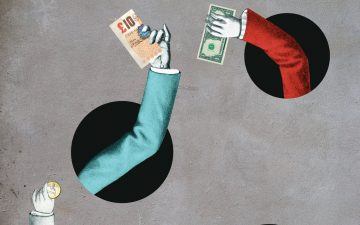David Edgerton in New Statesman:
 How did the most successful conservative party of the 20th century become the agent for a national humiliation? How could a political party so firmly tied to power, not least economic power, come to disregard its own particular view of the national interest? The Conservative-born Brexit crisis that has tormented the nation since 2016 has multiple causes, the most crucial and under-explored of which is economic. The great financial crisis of 2008 certainly had an impact on the referendum result: it led to economic stagnation, not least in productivity and wages, as well as disastrous cuts to many public services. Local authorities, responsible for social care, were hit especially hard, as were the working poor. But the really significant economic transformations behind the decision to leave the EU have deeper roots. Over the past 40 years the nature of capitalism in the UK has changed in ways that concepts such as “neoliberalism” and “post-industrialism” have failed to grasp. The relationship between capitalism and politics has also changed radically.
How did the most successful conservative party of the 20th century become the agent for a national humiliation? How could a political party so firmly tied to power, not least economic power, come to disregard its own particular view of the national interest? The Conservative-born Brexit crisis that has tormented the nation since 2016 has multiple causes, the most crucial and under-explored of which is economic. The great financial crisis of 2008 certainly had an impact on the referendum result: it led to economic stagnation, not least in productivity and wages, as well as disastrous cuts to many public services. Local authorities, responsible for social care, were hit especially hard, as were the working poor. But the really significant economic transformations behind the decision to leave the EU have deeper roots. Over the past 40 years the nature of capitalism in the UK has changed in ways that concepts such as “neoliberalism” and “post-industrialism” have failed to grasp. The relationship between capitalism and politics has also changed radically.
Before 1945 the UK operated in a global economy. Imperialists viewed Britain as the political and commercial centre of an empire; liberals saw it as the world’s largest importer. After 1945, however, the UK turned in on itself, transforming both materially and ideologically. It was a country with a national industry. All the main users of coal, as well as the producers of coal, became publicly owned industries, such as the National Coal Board, the British Transport Commission (which included British Railways) and the British Electricity Authority. There was also something resembling a British national capitalism, one closely allied to the Conservative Party and made up of large private firms, including Imperial Chemical Industries and Associated Electrical Industries. This national capitalism produced a radically different economy from anything that had existed before it. In the 1950s and 1960s, the UK was more industrial than ever before. Manufacturing output formed a higher proportion of GDP and manufacturing employment had a greater share of employment than when the UK was considered the “workshop of the world” in the 19th century.
More here.
